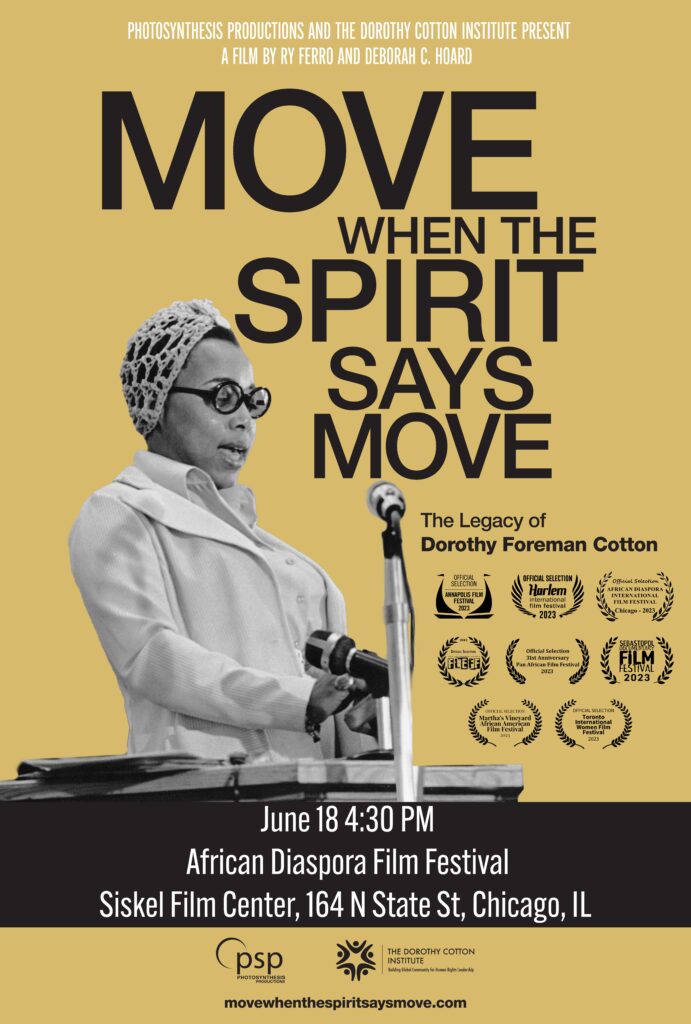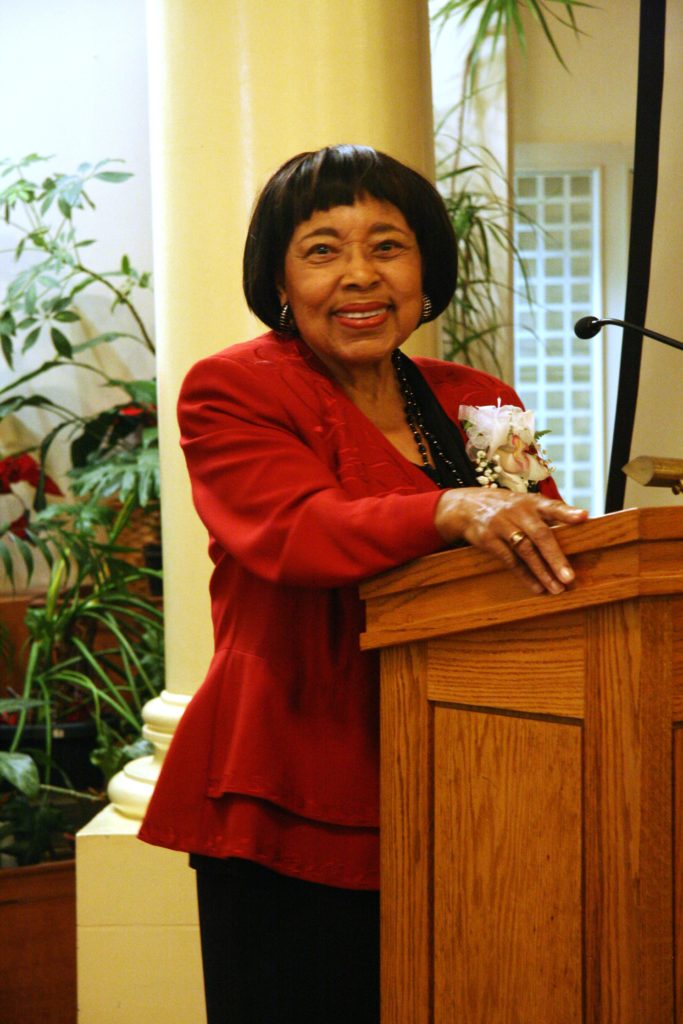Today is June 9. Had she lived, this would be Dorothy Foreman Cotton’s 93rd birthday. Even now, her well-deserved stardom is rising.
Through our documentary Move When the Spirit Says Move: the Legacy of Dorothy Foreman Cotton, she is continuing to teach, affirm and motivate people with her life story, the narratives of her colleagues, friends and family, and most powerfully, her own voice.
The film is a collaboration between the Dorothy Cotton Institute and filmmakers Deborah Hoard and Ry Ferro at PhotoSynthesis Productions (PSP). You can read about our team and see a full and growing list of film festivals where the documentary has been or will be featured. This film has a big impact on people, and viewers have commented that it should be seen by all students and teachers.
Here in Ithaca, MOVE it had its east coast premier in April at the Finger Lakes Environmental Film Festival (FLEFF) for a two-week run at indie film house Cinemapolis, then was back by popular demand for a week-long encore in May. We are excited that through the generosity of the Ithaca City School District, the Park Foundation, and the support of a large number of individual donors, over 300 high school students, teachers, and a group of Seniors in our community have been able to see the film for free. Yesterday morning and today, around 230 students from Lehman Alternative School and Ithaca High School saw Move When the Spirit Says Move with their teachers. We are truly delighted and hope to hear about the young people’s experiences.
 Beyond Ithaca, Dorothy Cotton’s story has moved and inspired activists and educators at a number of special screenings: for Civil and Human Rights icons and foot soldiers at the National Council of Elders; for the Highlander Research and Education Center’s 90th anniversary and with their support, at a conference of Folk Schools in Copenhagen; for the Children’s Defense Fund Freedom School training; and this month, at Juneteenth celebrations at Colorlines.com, the African Diaspora Film Festival in Chicago, and the Nashville African American Music Museum.
Beyond Ithaca, Dorothy Cotton’s story has moved and inspired activists and educators at a number of special screenings: for Civil and Human Rights icons and foot soldiers at the National Council of Elders; for the Highlander Research and Education Center’s 90th anniversary and with their support, at a conference of Folk Schools in Copenhagen; for the Children’s Defense Fund Freedom School training; and this month, at Juneteenth celebrations at Colorlines.com, the African Diaspora Film Festival in Chicago, and the Nashville African American Music Museum.
At the SCLC, Dorothy’s work with Septima Clark and Andrew Young brought the powerful Citizenship Education Program classes to thousands of people throughout the southern states, struggling to end legalized segregation under Jim Crow laws. Their influence and courage in organizing to end American-style Apartheid led to the historic 1964 Civil Rights Act. and the 1965 Voting Rights Act, which we will be commemorating and celebrating this August 6th. We believe that Dorothy would be so very proud that her remarkable legacy is alive and moving people who had never heard about her. We also believe that this film contributes a compelling affirmation of the power of education, our right to know our rights, and to know and truthfully teach our American history.
“We are all diminished when the rights of any are violated. We will thrive as individuals and as a collective when all our rights are protected and respected. The movement for human rights is a story about all of us, opening up a space for the beloved community”.
(Dorothy Cotton, If your Back’s Not Bent, 2012: p.322)
Here is a piece from Good Morning America, first aired in January, 2019 in honor of Dr. King’s birthday, offering glimpses of the immense contributions of Coretta Scott King, Dorothy F. Cotton, Jo Ann Robinson, Ella Baker, and Rosa Parks.
In contrast to the title of the article, none of these leaders were primarily “helpers” to MLK, Jr., but rather, they were powerful change-makers and movement leaders in their own right. These women helped chart the course of history.
Read in ABC News: https://apple.news/ASyo-

Dorothy Cotton honored at Unitarian Church, Ithaca, upon receiving National Freedom Award, Dec. 19, 2010; photo by Beth Bannister
The Dorothy Cotton Institute (DCI) was founded in 2008 to continue and expand on the legacy and spirit of Dorothy’s life work. Dorothy wanted the work of the DCI to be relevant to contemporary issues and to bring visibility to 21st century efforts for justice and freedom, social transformation and Beloved Community. From a seed idea for a fellowship in her name, our vision grew to an institute, and DCI’s taproot branched from civil rights to global human rights leadership.
Although Dorothy worked as a college administrator for nine years, she often said privately that if we had waited for academia to do something about racial apartheid in the US, we never would have had a civil rights movement. She was asked several times to speak with groups of students who were protesting at Cornell’s Day Hall. During the Anti-Apartheid movement, Dorothy walked over to students who were sitting-in, demanding that Cornell divest from South Africa, smiled, and asked the students “Why aren’t you singing?” and sing they did!
Dorothy enjoyed engaging with young people and educators around the country about civil rights and social justice, receiving many requests from college students seeking interviews or help with dissertations. As a guest lecturer and powerful keynote speaker, she was much in demand; she spoke several times a year at colleges and conferences, gave commencement addresses, and attended the annual Congressional pilgrimage march from Selma to Montgomery. She was generous with her attention and prepared her presentations and remarks thoughtfully, filling her books with post-its and covering her materials with handwritten notes, lyrics, and quotes to share from poems and wisdom teachers.
Dorothy was vivacious, ethical, an avid reader and a life-long learner. She spent many hours working with us to articulate DCI’s values, and to re-design the Citizenship Education Program for the 21st Century, and she co-led those workshops with us, to the delight of our participants. She remained passionately engaged by current events throughout her life, asking what we could do to address the abuses that concerned her: genocide, war, violence against women and children, and mass incarceration. She wanted to find out how people who’d been mortal enemies came to forgive one another and create new endeavors together.
Building Beloved Community was a touchstone. Even in the last two months of her life, she was teaching local organizers of the new Poor People’s Campaign freedom songs from the Civil Rights Movement, songs that build courage and solidarity. Deeply committed to nonviolence as a way of life, she saw it as neither passivity nor a mere tactic, but as Satyagraha— the Force which is born of holding onto Truth and Love. Nonviolence requires self-discipline, bravery, compassion, and conscience. Dorothy shared Martin Luther King’s conviction that “the end is preexistent in the means…and that destructive means cannot bring about constructive ends.” Her lifework proved that people can find the power within ourselves to challenge injustice and make positive change. She encouraged us to believe in ourselves, speak up, be bold and fully engaged, exercise our rights and responsibilities, and to stop waiting for somebody else to follow or to make things better. It’s truly up to us!
© Dorothy Cotton Institute 2018, with permission